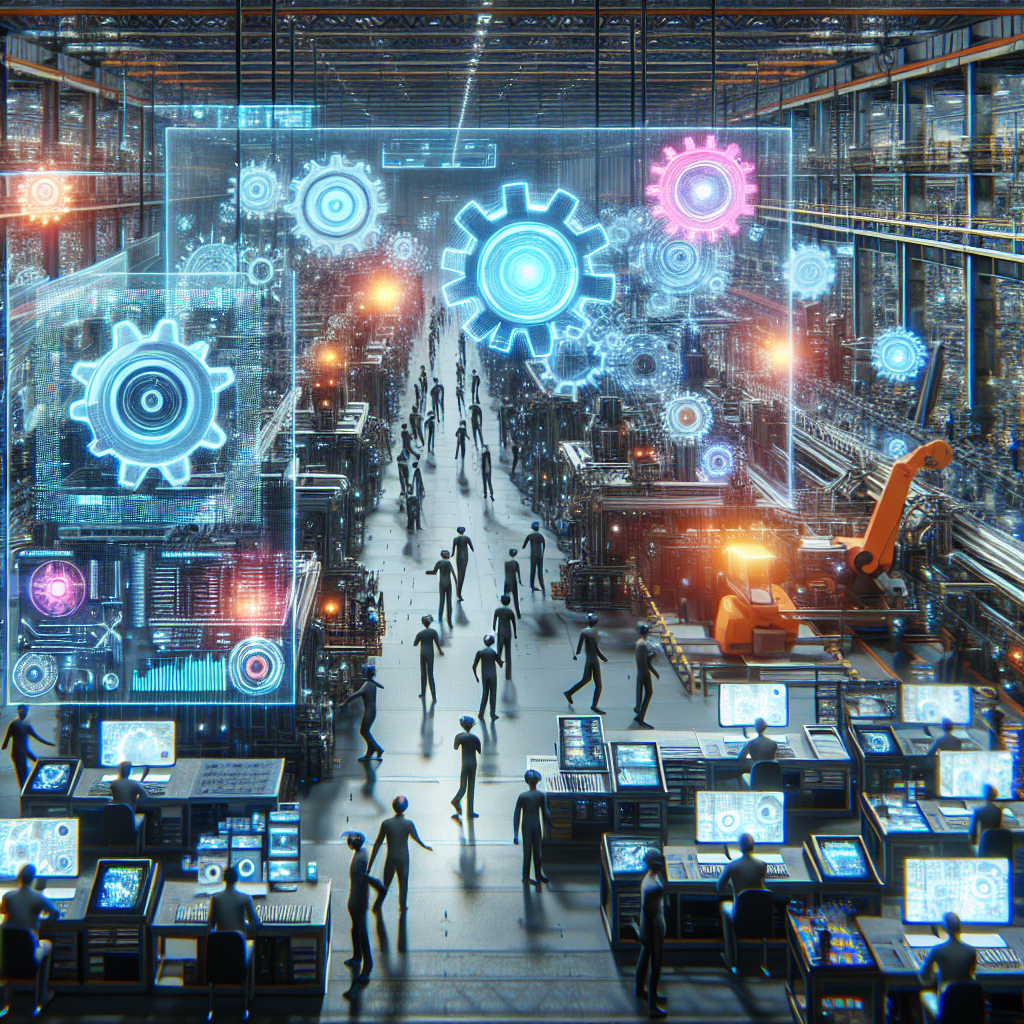In today’s rapidly evolving technological landscape, Artificial Intelligence (AI) has emerged as a game-changer for various industries, including manufacturing. AI solutions are transforming traditional manufacturing processes by enabling greater efficiency, productivity, and innovation. From predictive maintenance to quality control, AI is revolutionizing how products are designed, produced, and delivered to customers.
One of the key ways AI is enhancing manufacturing is through predictive maintenance. Traditionally, manufacturers relied on scheduled maintenance to prevent machine breakdowns and ensure optimal performance. However, this approach is not only costly but also inefficient as it often leads to unexpected downtime and lost productivity. AI-driven predictive maintenance uses machine learning algorithms to analyze data from sensors and equipment to predict when a machine is likely to fail. By proactively addressing maintenance issues, manufacturers can reduce downtime, extend the lifespan of equipment, and optimize production schedules.
Another area where AI is making a significant impact in manufacturing is quality control. Ensuring product quality is crucial for maintaining customer satisfaction and brand reputation. AI-powered quality control systems use computer vision and machine learning algorithms to inspect products for defects and deviations from quality standards. By automating the inspection process, manufacturers can detect defects more accurately and quickly, leading to improved product quality and reduced waste. Furthermore, AI can analyze data from the production line to identify patterns and trends that can help optimize manufacturing processes and improve product quality over time.
AI is also revolutionizing the design and prototyping process in manufacturing. By using generative design algorithms, manufacturers can explore a wider range of design options and find innovative solutions to complex engineering problems. AI-powered design tools can analyze vast amounts of data and generate design alternatives that meet specific performance criteria, such as weight reduction or material optimization. This not only accelerates the design process but also leads to more efficient and cost-effective products.
In addition to predictive maintenance, quality control, and design optimization, AI is also being used to optimize supply chain management in manufacturing. By analyzing historical data and real-time information, AI algorithms can predict demand, optimize inventory levels, and improve logistics planning. This leads to reduced costs, shorter lead times, and better customer service. AI-powered supply chain management systems can also identify potential bottlenecks and risks in the supply chain, enabling manufacturers to take proactive measures to mitigate disruptions and ensure continuity of operations.
Overall, AI solutions are transforming the manufacturing industry by enabling greater efficiency, productivity, and innovation. By leveraging the power of AI, manufacturers can improve operational processes, enhance product quality, and drive business growth. As AI continues to evolve and mature, its impact on manufacturing is expected to become even more profound, leading to a new era of smart, connected, and automated manufacturing.
FAQs:
Q: What are the potential benefits of implementing AI solutions in manufacturing?
A: Implementing AI solutions in manufacturing can lead to a wide range of benefits, including increased efficiency, improved productivity, enhanced product quality, reduced costs, and better decision-making. By leveraging AI technologies, manufacturers can optimize operational processes, automate repetitive tasks, and drive innovation in product design and production.
Q: How can manufacturers integrate AI solutions into their existing processes?
A: Manufacturers can integrate AI solutions into their existing processes by investing in AI technologies, such as predictive maintenance systems, quality control tools, and design optimization software. It is important for manufacturers to assess their specific needs and goals, as well as the capabilities of different AI solutions, to determine the best approach for integration. Collaborating with AI experts and technology providers can also help manufacturers successfully implement AI solutions in their operations.
Q: Are there any challenges associated with implementing AI solutions in manufacturing?
A: While AI solutions offer significant benefits to manufacturers, there are also challenges associated with their implementation. Some of the key challenges include data privacy and security concerns, workforce training and reskilling, integration with existing systems, and cultural resistance to change. Manufacturers need to address these challenges proactively and develop a comprehensive strategy for implementing AI solutions to maximize their potential benefits.
Q: How can manufacturers measure the ROI of AI solutions in manufacturing?
A: Manufacturers can measure the ROI of AI solutions in manufacturing by tracking key performance indicators, such as productivity gains, cost savings, quality improvements, and customer satisfaction. By comparing these metrics before and after implementing AI solutions, manufacturers can quantify the impact of AI on their operations and make data-driven decisions to optimize their investment in AI technologies. Additionally, manufacturers can conduct pilot projects and case studies to demonstrate the value of AI solutions and justify their adoption in manufacturing.
In conclusion, AI solutions are transforming the manufacturing industry by enabling greater efficiency, productivity, and innovation. By leveraging AI technologies in areas such as predictive maintenance, quality control, design optimization, and supply chain management, manufacturers can improve operational processes, enhance product quality, and drive business growth. As AI continues to advance, its impact on manufacturing is expected to become even more profound, leading to a new era of smart, connected, and automated manufacturing.

